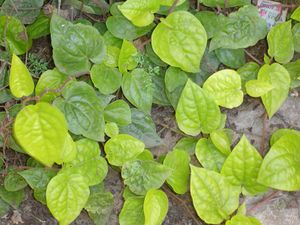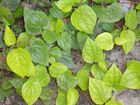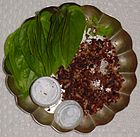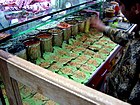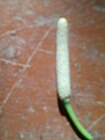Note: This is a project under development. The articles on this wiki are just being initiated and broadly incomplete. You can Help creating new pages.
Difference between revisions of "Piper betle - Nagavallari"
(→Mode of Propagation) |
|||
| Line 1: | Line 1: | ||
[[File:Piper betle plant.jpg|thumb|right|''betel leaf'', ''Piper betle'', ''Nagavallari'']] | [[File:Piper betle plant.jpg|thumb|right|''betel leaf'', ''Piper betle'', ''Nagavallari'']] | ||
| − | '''Piper betle''' | + | '''Piper betle''' is eulogized by ayurveda acharyas for their immense medicinal properties. Piper betle is a vine which belongs to Piperacea family. This vine has heart shaped leaves and is mostly grown in South East Asia. |
| − | |||
==Uses== | ==Uses== | ||
{{Uses|Wounds}}, {{Uses|Joint pains}}, {{Uses|Stomach colicky}}, {{Uses|Indigestion}}, {{Uses|Bad breath}}, {{Uses|Weight loss}}, {{Uses|Erectile disfunction}}, {{Uses|Diarrhea}}, {{Uses|Sore throats}}. | {{Uses|Wounds}}, {{Uses|Joint pains}}, {{Uses|Stomach colicky}}, {{Uses|Indigestion}}, {{Uses|Bad breath}}, {{Uses|Weight loss}}, {{Uses|Erectile disfunction}}, {{Uses|Diarrhea}}, {{Uses|Sore throats}}. | ||
| Line 9: | Line 8: | ||
==Chemical Composition== | ==Chemical Composition== | ||
| − | Leaf contains Water (85-90%), Proteins (3-3.5%), Carbohydrates (0.5-6.1%), Minerals (2.3-3.3%), Fat (0.4-1%), Fibre (2.3%), Essential oil (0.08-0.2%), Tannin (0.1-1.3%), Alkaloid | + | Leaf contains Water (85-90%), Proteins (3-3.5%), Carbohydrates (0.5-6.1%), Minerals (2.3-3.3%), Fat (0.4-1%), Fibre (2.3%), Essential oil (0.08-0.2%), Tannin (0.1-1.3%), Alkaloid. <ref name="chemical composition"/> |
==Common names== | ==Common names== | ||
| Line 35: | Line 34: | ||
==Identification== | ==Identification== | ||
===Leaf=== | ===Leaf=== | ||
| − | {{Leaf|Simple| | + | {{Leaf|Simple|Ovate-oblong|Those at apex of stem sometimes elliptic, 7-15 × 5-11 cm}}<ref name="Leaf"/> |
===Flower=== | ===Flower=== | ||
| Line 41: | Line 40: | ||
===Fruit=== | ===Fruit=== | ||
| − | {{Fruit|General|7–10 mm| | + | {{Fruit|General|7–10 mm|Clearly grooved lengthwise, Lowest hooked hairs aligned towards crown||Many}} |
===Other features=== | ===Other features=== | ||
| Line 55: | Line 54: | ||
==How to plant/cultivate== | ==How to plant/cultivate== | ||
| − | Cuttings 30 - 45cm long, taken from the tips of vertical shoots | + | Cuttings 30 - 45cm long, taken from the tips of vertical shoots.<ref name="How to plant/cultivate"/> |
| − | |||
==Commonly seen growing in areas== | ==Commonly seen growing in areas== | ||
| Line 80: | Line 78: | ||
<references> | <references> | ||
| − | <ref name="chemical composition">[https://www.bimbima.com/ayurveda/medicinal-uses-of-betel-leafpaan/302/ | + | <ref name="chemical composition">[https://www.bimbima.com/ayurveda/medicinal-uses-of-betel-leafpaan/302/ Constituents]</ref> |
| − | <ref name="Leaf">[http://eol.org/pages/491360/details | + | <ref name="Leaf">[http://eol.org/pages/491360/details Morphology]</ref> |
| − | <ref name="Ayurvedic preparations">[https://easyayurveda.com/2019/05/23/betel-benefits-uses-side-effects-dose-research/ | + | <ref name="Ayurvedic preparations">[https://easyayurveda.com/2019/05/23/betel-benefits-uses-side-effects-dose-research/ Ayurvedic preparations]</ref> |
| − | <ref name="How to plant/cultivate">[http://tropical.theferns.info/viewtropical.php?id=Piper+betle | + | <ref name="How to plant/cultivate">[http://tropical.theferns.info/viewtropical.php?id=Piper+betle Cultivation details]</ref> |
</references> | </references> | ||
Latest revision as of 16:54, 2 July 2020
Piper betle is eulogized by ayurveda acharyas for their immense medicinal properties. Piper betle is a vine which belongs to Piperacea family. This vine has heart shaped leaves and is mostly grown in South East Asia.
Contents
- 1 Uses
- 2 Parts Used
- 3 Chemical Composition
- 4 Common names
- 5 Properties
- 6 Habit
- 7 Identification
- 8 List of Ayurvedic medicine in which the herb is used
- 9 Where to get the saplings
- 10 Mode of Propagation
- 11 How to plant/cultivate
- 12 Commonly seen growing in areas
- 13 Photo Gallery
- 14 References
- 15 External Links
Uses
Wounds, Joint pains, Stomach colicky, Indigestion, Bad breath, Weight loss, Erectile disfunction, Diarrhea, Sore throats.
Parts Used
Chemical Composition
Leaf contains Water (85-90%), Proteins (3-3.5%), Carbohydrates (0.5-6.1%), Minerals (2.3-3.3%), Fat (0.4-1%), Fibre (2.3%), Essential oil (0.08-0.2%), Tannin (0.1-1.3%), Alkaloid. [1]
Common names
| Language | Common name |
|---|---|
| Kannada | Veelyade Ele |
| Hindi | |
| Malayalam | |
| Tamil | Vettilai |
| Telugu | Tamalapaku |
| Marathi | NA |
| Gujarathi | NA |
| Punjabi | NA |
| Kashmiri | NA |
| Sanskrit | |
| English | Betel pepper |
Properties
Reference: Dravya - Substance, Rasa - Taste, Guna - Qualities, Veerya - Potency, Vipaka - Post-digesion effect, Karma - Pharmacological activity, Prabhava - Therepeutics.
Dravya
Rasa
Tikta (Bitter), Kashaya (Astringent)
Guna
Laghu (Light), Ruksha (Dry), Tikshna (Sharp)
Veerya
Ushna (Hot)
Vipaka
Katu (Pungent)
Karma
Kapha, Vata
Prabhava
Habit
Identification
Leaf
| Kind | Shape | Feature |
|---|---|---|
| Simple | Ovate-oblong | Those at apex of stem sometimes elliptic, 7-15 × 5-11 cm |
Flower
| Type | Size | Color and composition | Stamen | More information |
|---|---|---|---|---|
| Unisexual | 2-4cm long | Yellow | 2 | Flowers Season is May-Jul |
Fruit
| Type | Size | Mass | Appearance | Seeds | More information |
|---|---|---|---|---|---|
| General | 7–10 mm | Clearly grooved lengthwise, Lowest hooked hairs aligned towards crown | Many | {{{6}}} |
Other features
List of Ayurvedic medicine in which the herb is used
Where to get the saplings
Mode of Propagation
How to plant/cultivate
Cuttings 30 - 45cm long, taken from the tips of vertical shoots.[4]
Commonly seen growing in areas
Trophical area, Coastal areas.
Photo Gallery
References
External Links
- Ayurvedic Herbs known to be helpful to treat Wounds
- Ayurvedic Herbs known to be helpful to treat Joint pains
- Ayurvedic Herbs known to be helpful to treat Stomach colicky
- Ayurvedic Herbs known to be helpful to treat Indigestion
- Ayurvedic Herbs known to be helpful to treat Bad breath
- Ayurvedic Herbs known to be helpful to treat Weight loss
- Ayurvedic Herbs known to be helpful to treat Erectile disfunction
- Ayurvedic Herbs known to be helpful to treat Diarrhea
- Ayurvedic Herbs known to be helpful to treat Sore throats
- Herbs with Vines used in medicine
- Herbs with Leaves used in medicine
- Herbs with Roots used in medicine
- Herbs with Fruits used in medicine
- Herbs with common name in Kannada
- Herbs with common name in Tamil
- Herbs with common name in Telugu
- Herbs with common name in English
- Habit - Evergreen climbing shrub
- Index of Plants which can be propagated by Cuttings
- Herbs that are commonly seen in the region of Trophical area
- Herbs that are commonly seen in the region of Coastal areas
- Herbs
- Piperaceae
